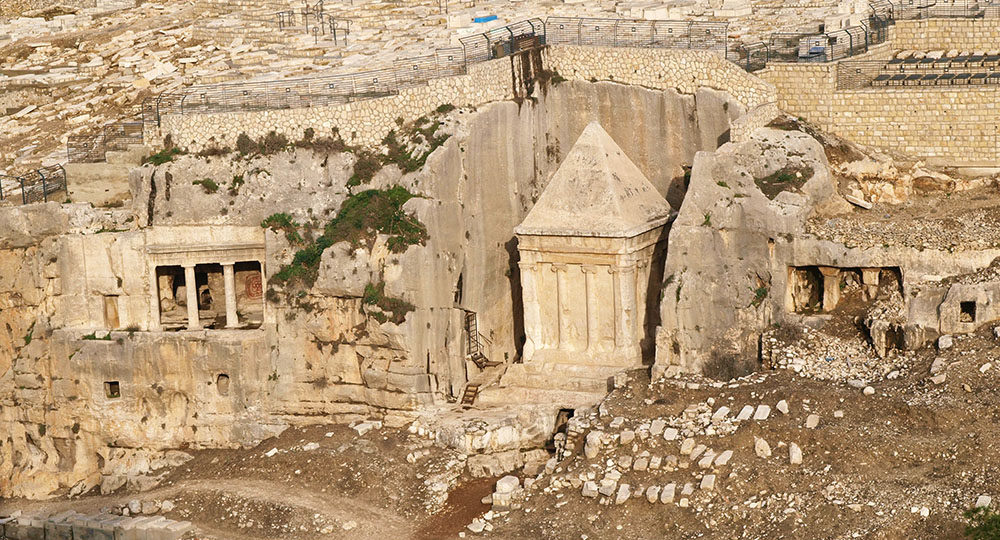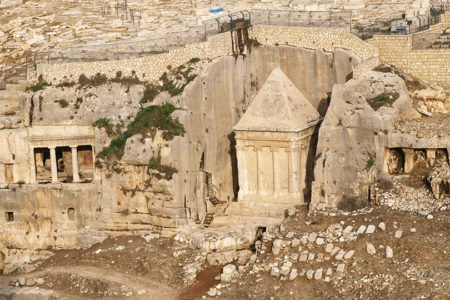The Herald Cometh
I love Christmas, every single aspect of it. I enjoy all of the decorations, the music, the shopping, and even the crowded malls. But the part I love the most is reading the biblical account of the birth of the long-expected Jewish Messiah. It is in chapter 2 of the Gospel of Luke’s beautiful and warmly familiar text that God reveals His love for Israel and the world.
Most people don’t realize, however, that the Christmas story actually begins in Luke 1:
There was in the days of Herod, the king of Judea, a certain priest named Zacharias, of the division of Abijah. His wife was of the daughters of Aaron….They were both righteous before God, walking in all the commandments and ordinances of the Lord blameless. But they had no child…and they were both well advanced in years (Lk. 1:5–7).
Zacharias and his wife, Elizabeth, were both of the tribe of Levi; and Zacharias was “of the division of Abijah.”
When the appointed time arrived for a specific division to minister, Scripture says lots were drawn to see who in that group worked in which areas of the Temple:
So it was, that while he was serving as priest before God in the order of his division, according to the custom of the priesthood, his lot fell to burn incense when he went into the temple of the Lord. And the whole multitude of the people was praying outside at the hour of incense (vv. 8–10).
Incense in the Bible often represents the prayers of God’s people. David captured this idea in Psalm 141:2: “Let my prayer be set before You as incense.” And the beloved disciple John declared in Revelation 5:8, “The four living creatures and the twenty-four elders fell down before the Lamb, each having a harp, and golden bowls full of incense, which are the prayers of the saints.”
As Zacharias served inside the Temple, the people prayed outside, probably asking God to bless the nation.
This might have been the priest’s only opportunity to minister in this capacity. Wrote a commentator, “The announcement of John’s birth comes at a high moment in Zechariah’s [sic] career. As one of about eighteen thousand priests, Zechariah [sic] serves in the temple twice a year, but only once in his life does he get to assist in the daily offering by going into the holy place.”1
A Startling Announcement
While Zacharias was in the Temple, “an angel of the Lord appeared to him, standing on the right side of the altar of incense. And when Zacharias saw him, he was troubled, and fear fell upon him” (Lk. 1:11–12).
One can only imagine the terror that gripped this man of God. It had been 400 years since the Lord had communicated in any way with the Jewish people. Between the conclusion of the Hebrew canon of Scripture and the announcement to Zacharias, four centuries had elapsed. There had been no angelic visits or prophetic dreams or visions. Even the prophets of old had seemingly vanished. The Lord was silent.
For us today, a 400-year span would mean that the last time anyone received a word from the Lord would have been in 1608. The Ottoman Empire was in power in the Middle East; and Captain John Smith, president of the Jamestown Colony in the New World, was saved from death by the Indian princess Pocahontas. Needless to say, 400 years is a long time.
It is easy to understand why the priest was troubled. The angel quickly sought to allay his fear: “Do not be afraid, Zacharias, for your prayer is heard; and your wife Elizabeth will bear you a son, and you shall call his name John” (v. 13). Zacharias must have been mystified, amazed, and frightened—all at the same time.
The angel was Gabriel (v. 19) who would later appear to Mary and Joseph. He is one of only three angels named in Scripture. The other two are Michael the archangel, who is a protector and defender of the Jewish people (Dan. 10:13; Rev. 12:7), and Lucifer, the fallen cherub (Isa. 14:12; Ezek. 28:14) who rebelled against his Creator and became Satan, the enemy of God.
Gabriel’s words must have astonished the aged man. He was told that he and Elizabeth “will have joy and gladness, and many will rejoice at his [son’s] birth. For he will be great in the sight of the Lord” (Lk. 1:14–15). Gabriel was announcing the birth of the man who would herald the long-prayed-for Messiah. John’s work had been foretold by the prophet Isaiah (cf. Isa. 40:3–5).
The angel announced that John would “turn many of the children of Israel to the Lord their God” and “go before Him [the Messiah] in the spirit and power of Elijah” (Lk. 1:16–17), thus describing the role that John would play. He would be the bridge between the silence of the preceding centuries and the Incarnation of the Savior and Redeemer of Israel and the world.
“How shall I know this? For I am an old man” Zacharias asked (v. 18). Since God had not manifested His presence for centuries, the priest’s skepticism might seem logical. But his question led to a divinely ordained nine-month muteness that might have been designed to communicate to those outside the Temple that he had been visited by the God of Israel. His inability to speak would substantiate the fact that God was actively involved in what was happening.
Furthermore, God knew His priest’s heart, and He probably wanted Zacharias to learn a lesson in faith and trust in the Lord. Often physical affliction drives us to our knees and teaches lessons that can only come through times of testing. This must have been the case for Zacharias, who did not speak again until his son was born. Asked what the child’s name would be, he wrote, ‘His name is John’….Immediately his mouth was opened and his tongue loosed, and he spoke, praising God” (vv. 63–64).
John literally means “God is gracious.” And indeed He was gracious to His beloved priest, to the nation at large, and to the entire world.
“So the child grew and became strong in spirit…till the day of his manifestation to Israel” (v. 80). It was Jesus Himself who testified to the integrity and life of this very choice servant of God: “A prophet? Yes, I say to you, and more than a prophet. For I say to you, among those born of women there is not a greater prophet than John the Baptist” (7:26, 28).
ENDNOTES
- “Announcing the Forerunner: John the Baptist” <biblegateway.com/resources/commentaries/index.php?action=getCommentaryText&cid=3&source=1&seq =i.49.1.3>.







